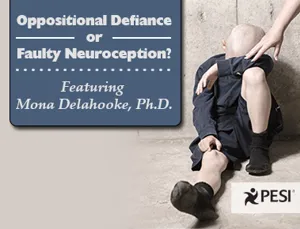Oppositional Defiance or Faulty Neuroception?

Over the years I have come to believe that oppositional defiant disorder (ODD) is not a label that should be used to describe young children. As a developmental psychologist, I view oppositional defiance as a child’s response to stress. Viewing children’s challenging behaviors on a continuum of stress and stress recovery reveals a whole new way to think about this stigmatizing disorder, as well as a new way to support children, informed by neuroscience.
Consider the case of Timmy, an 8 year-old boy in the foster care system, who was diagnosed with ODD when he was four years old. His numerous behavioral treatment plans seldom improved his oppositional behaviors. Prone to constantly disagree, run away and hit others, the child had been placed in three different foster homes in a single year. At school, after he found out that a beloved PE teacher was suddenly transferred, he refused all class work and eventually threw over his desk, frantic, when the teacher asked him to line up for lunch.
Oppositional defiance? Hardly. The child was in a stress response due to challenges in his neuroception, the automatic and subconscious detection of threat, described by pre-eminent neuroscientist Stephen Porges, Ph.D.
Neuroception is the brain’s ability to detect danger. It’s how we distinguish whether situations or people are safe or threatening. Porges believes that faulty neuroception is at the root of many psychiatric disorders, including ODD. For many vulnerable children, neuroception is biased towards detecting danger when there is no real danger. Faulty neuroception shifts the child involuntarily into a defensive position, resulting in a variety of challenging behaviors. This can result from a host of causes (but not limited to) constitutional; genetic or brain wiring differences; biomedical issues; environmental stress; or sensory processing challenges, which cause a child to perceive ordinary sensations as threatening.
It is essential to determine the exact cause on an individual basis. The sources of faulty neuroception are wide- ranging and depend on each child’s individual differences. In order to help children, we need to provide the proper support to address the cause, rather than simply applying behavioral management techniques in isolation.
Currently, our most vulnerable oppositional and defiant children are generally managed with plans that work on eliminating unwanted behaviors, rewarding desired behaviors, or withholding treasured objects or experiences (such as screen time) as consequences to those behaviors. These techniques are often ineffective because they are based on a faulty premise: that the child has intentional control over those behaviors. If faulty neuroception is to blame, however, behaviors will be a reflection of an immediate, “fight or flight” response and not purposeful misbehavior. In such cases, punishment can potentially cause more distress, triggering additional feelings of threat rather than safety.
It will benefit all children when mental health and social service systems recognize faulty neuroception as an underlying commonality of many psychiatric disorders. This shift will help providers and caregivers move beyond current, often ineffective strategies for treating conditions such as oppositional defiance. Treatment techniques such as ignoring and withholding attention or desired objects are inappropriate when a child’s brain is experiencing the message that he is not safe.
As the first priority in treatment, we need to turn instead to the foundation of mental health for all human beings: nurturing relationships that consistently provide the healing messages of safety. Working with qualified professionals, it is possible to help children with the most challenging behaviors. Effective and long-lasting ways to help our most vulnerable children thrive should:
- Build or rebuild a sense of connection with trusted caregivers
All children, regardless of age, need consistent attention to their emotional and physical needs. This includes loving attention when they distress and the consistent support of an adult who will understand when challenging behaviors are a sign of faulty neuroception.
- Discover each child’s vulnerabilities and individual differences
Some children have unique characteristics that make calming more difficult including over or under- reactivity to touch, sound smell, movement, emotions, experiences of trauma, etc. Understanding each child’s individual differences and history will provide a roadmap to supporting a neuroception of safety.
- Help the child signal when he needs help and feels vulnerable
Oppositional defiance is often a reaction to feeling small, helpless and out of control. Encourage each child’s ability to signal (verbally or non –verbally) that he is beginning to feel uncomfortable or anxious.
- Provide the correct support for each child
Determine the best way to help children feel calm. Each child is different, so try a variety of methods to see what she enjoys. Play, cuddle, dance, sing, and try to figure out what brings the child joy. This will allow spontaneous social engagement behaviors to emerge that will support connectedness and biobehavioral co-regulation, resulting in her body and mind calming down and feeling safe.
Let’s move beyond the categorical checklists that describe symptoms in the absence of their causes, and view oppositional defiance in a way that respects the complexity of the human brain and the adaptations human beings make to feel safe in a world that often feels threatening. All children will benefit from this important shift in our understanding of oppositional defiance.
*Immense appreciation to Dr. Porges for reviewing this post and for his groundbreaking work.
*My new book explains the shift in understanding challenging behaviors and how we can utilize the powerful tools Dr. Porges and other neuroscientists provide to support children.





